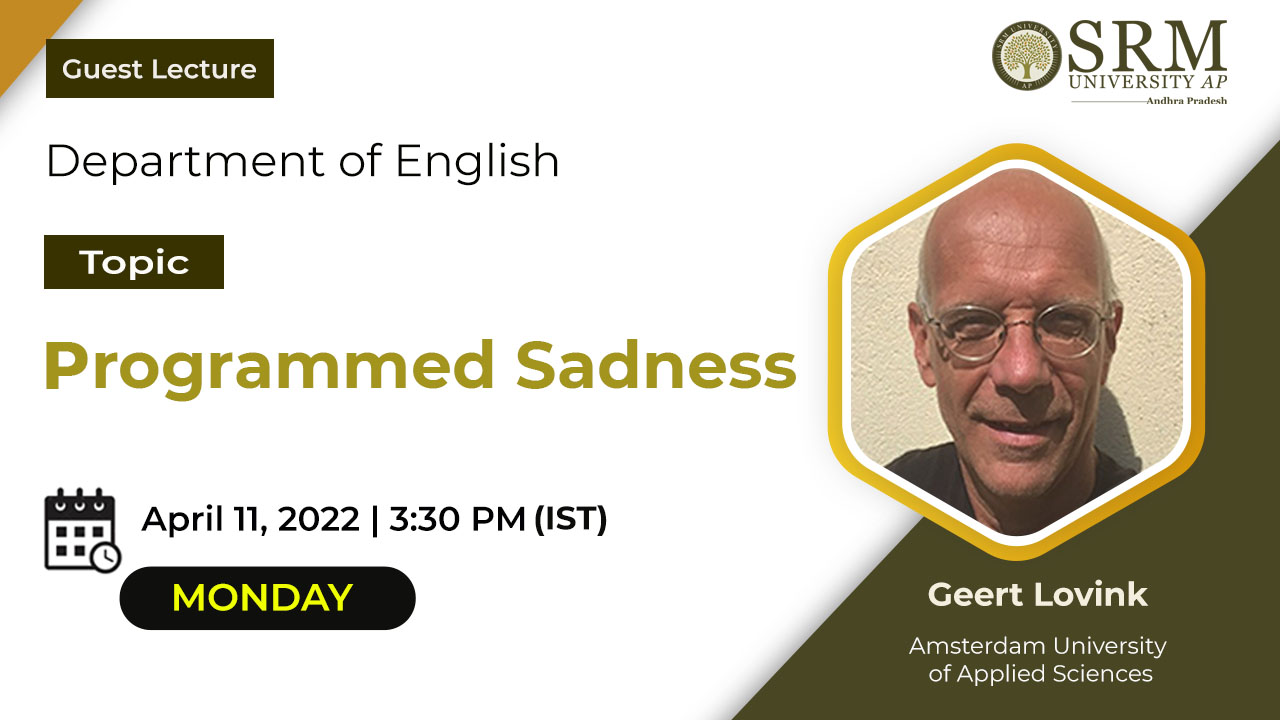Scholarly Exploration into Nuanced Portrayal of Human Experiences
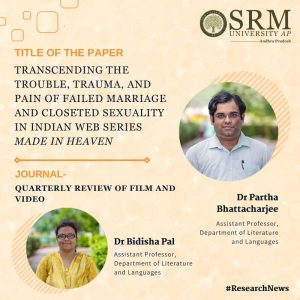 Dive into the realms of contemporary literature as our esteemed faculty members, Dr Partha Bhattacharjee and Dr Bidisha Pal from the Department of Literature and Languages presented their latest research endeavor. Their collaborative paper, titled “Transcending the Trouble, Trauma, and Pain of Failed Marriage and Closeted Sexuality in Indian Web Series Made in Heaven,” has found its home in the prestigious journal “Quarterly Review of Film and Video” (Scopus Q2).This scholarly exploration take into the portrayal of human experiences in the context of failed relationships and concealed identities within the framework of Indian web series. Join us in celebrating their insightful contributions to the literary discourse, reflecting SRM AP’s commitment to advancing knowledge and fostering academic excellence.
Dive into the realms of contemporary literature as our esteemed faculty members, Dr Partha Bhattacharjee and Dr Bidisha Pal from the Department of Literature and Languages presented their latest research endeavor. Their collaborative paper, titled “Transcending the Trouble, Trauma, and Pain of Failed Marriage and Closeted Sexuality in Indian Web Series Made in Heaven,” has found its home in the prestigious journal “Quarterly Review of Film and Video” (Scopus Q2).This scholarly exploration take into the portrayal of human experiences in the context of failed relationships and concealed identities within the framework of Indian web series. Join us in celebrating their insightful contributions to the literary discourse, reflecting SRM AP’s commitment to advancing knowledge and fostering academic excellence.
Abstract
Premiered as a television web series on Amazon Prime Video on 8th March 2019, Made in Heaven (2019) simultaneously unmasks the hypocrisies and lies of the big fat Indian weddings and breaks the taboo of homosexuality. In consecutive nine episodes, the plots and the subplots are beaded together to initiate a sensory sensitization towards the hypocrisy of marriages and insensitive homophobia. Carefully analyzing postulates from theorists this short article attempts to decode the trouble, trauma, and pain encoded in messy lifestyles, marriages, and relationships characterizing and wielding the lives as well as the sexuality of the characters in the web series
Explanation in Layperson’s Terms
The research revolves around the concept of marriage in Indian society as well as homosexuality in the Indian Hindi web series Made in Heaven (2019). The research shows how the various episodes of the web series showcase different aspects of marriage and the actual reality behind the pomp and pleasure of high-profile weddings within society. On the other hand sexuality and sexual desire are often hidden and do not get proper channelization in a person’s life. The desire thus remains suppressed and results in crisis in many forms. There are other intertwined concerns such as the dowry system, social disparity, impotency, virginity, and sexual molestations which weave a meta-narrative on the popular medium and raise consciousness regarding how people should react to those hazards and behave accordingly.
Practical Implementation and Social Implications of the Research
The research involves practical aspects such as the dowry system, social disparity, impotency, virginity, and sexual molestations which are part of our social lives. Many people have to face such things in their day-to-day lives. This research brings out such realities of society while analyzing the mental condition and psychology behind these. Moreover, this research also shows marriage is an important decision in a person’s life, it should be made in terms of love and respect, not based upon money and social status. The research visits practical examples and revisits the laws to substantiate the arguments. Popular media such as web series is not just a form of entertainment, but it can be a medium for building awareness.
- Published in English Current Happenings, News, Research News
Intellectual realm of Vaishnava Philosophy and Poetic Aesthetics
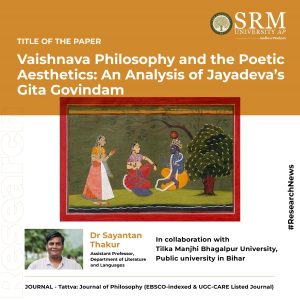 Dr Sayantan Thakur, Assistant Professor in the Department of Literature & Languages have published his research paper, ‘Vaishnava Philosophy and the Poetic Aesthetics: An Analysis of Jayadeva’s Gita Govindam‘ in Tattva: Journal of Philosophy, an esteemed EBSCO-indexed and UGC-CARE Listed Journal. Dr Thakur’s work embodies the spirit of academic rigor and philosophical inquiry. Join us in traversing the landscapes of wisdom, where intellect meets aesthetics, and knowledge transcends boundaries. Explore the rich tapestry of ideas that define SRM University-AP‘s commitment to intellectual excellence.
Dr Sayantan Thakur, Assistant Professor in the Department of Literature & Languages have published his research paper, ‘Vaishnava Philosophy and the Poetic Aesthetics: An Analysis of Jayadeva’s Gita Govindam‘ in Tattva: Journal of Philosophy, an esteemed EBSCO-indexed and UGC-CARE Listed Journal. Dr Thakur’s work embodies the spirit of academic rigor and philosophical inquiry. Join us in traversing the landscapes of wisdom, where intellect meets aesthetics, and knowledge transcends boundaries. Explore the rich tapestry of ideas that define SRM University-AP‘s commitment to intellectual excellence.
Abstract
Literature finds the best expression when literary aesthetics and philosophy run side by side. The former offers the external charm, while the latter inculcates the more profound implication with the aim of providing it with a superior stature and permanence. Jayadeva’s Gitagovindam, being a colossal work in the field of Vaishnava literature, does contain the brilliant juxtaposition of both. This article attempts to show how Jayadeva’s Gitagovindam, a colossal work in the field of Vaishnava literature, does contain the brilliant juxtaposition of both. On the one hand, like a typical lyrical poem, its melodic nature does have a soothing effect and on the other, the use of philosophy instils in it a greater depth and seriousness to uplift itself as a book of devotion and religious inspiration. Moreover, the importance of this Holy Scripture lies in the fact that it not only played a significant role in paving the way to form a new sect in the Vaishnava religion, known as ‘Gaudiya Vaishnavism’, but also showed the later Vaishnava lyricists the art of portraying in words the amorous love of Lord Krishna and Radha with compassion and tears.
Practical implementation and social implications of the research
Cultural Preservation: Understanding and analysing ancient texts like the Gitagovindam helps in preserving cultural and religious heritage. This research can contribute to the preservation and understanding of Vaishnava philosophy and its cultural significance.
Literary Understanding: Analysis of the text can provide insights into the interplay between philosophy and aesthetics in literature. It can be used as a tool for students, scholars, and enthusiasts to comprehend how profound thoughts are conveyed through art and literature.
Religious Studies: It will be valuable for religious scholars and practitioners, shedding light on the philosophical underpinnings of Vaishnavism. It can deepen the understanding of the religious sentiments associated with the worship of Lord Krishna.
Artistic Inspiration: By examining the poetic aesthetics the research might inspire contemporary artists, poets, and musicians in exploring similar thematic elements in their creations. It could lead to the creation of new artistic works that incorporate similar philosophical depth.
Community Understanding: Studies like mine can also bridge gaps in understanding between different communities by shedding light on the beliefs and values encapsulated in ancient texts. This understanding might foster better cultural appreciation and harmony.
Interdisciplinary Insights: The analysis might encourage interdisciplinary studies by merging literary analysis with philosophy, offering new avenues for exploration and collaboration between these fields.
Collaborations
Dr. Uday Kumar Mishra, Professor, Department of English, TMBU
Future Research Plans
- Regional Literature in Translation
- Tantric Tradition and Eastern Indian Literature,
- Folk Music of Bengal,
- Indian Philosophy, Aesthetics & Literature
Link to the Article
https://journals.christuniversity.in/index.php/tattva/article/view/3640/2480
- Published in Departmental News, English Current Happenings, News, Research News
Humanities lead to different career avenues
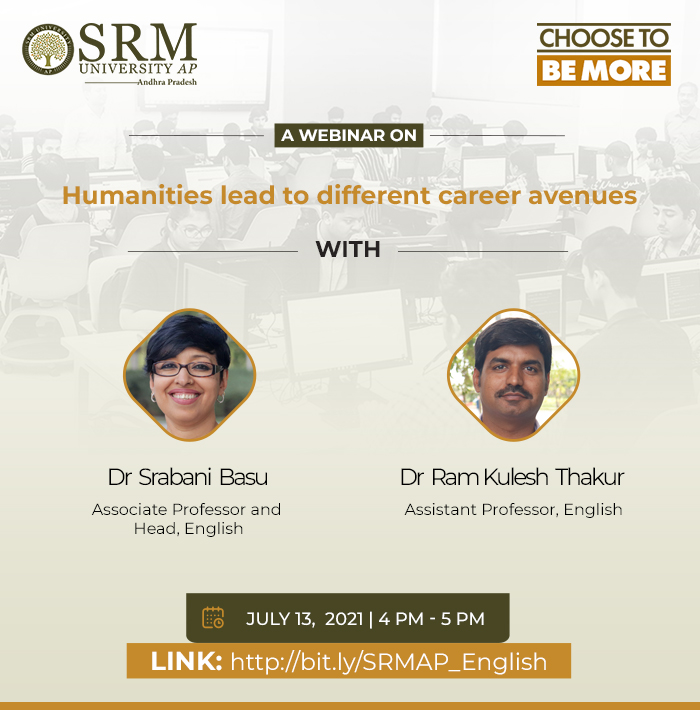 Humanities is the discipline that studies languages, histories and cultures. The BA English course at SRM University-AP offers students knowledge of the language and develops in them skills that foster their career paths. Dr Srabani Basu, Associate Professor and Head of the Department of English and Dr Ram Kulesh Thakur, Assistant Professor in the Department will explicate the course curriculum, subjects, scope, specialisation, and available job avenues of BA English course in a virtual session titled “Humanities lead to different career avenues” on July 13, 2021, at 4.00 pm.
Humanities is the discipline that studies languages, histories and cultures. The BA English course at SRM University-AP offers students knowledge of the language and develops in them skills that foster their career paths. Dr Srabani Basu, Associate Professor and Head of the Department of English and Dr Ram Kulesh Thakur, Assistant Professor in the Department will explicate the course curriculum, subjects, scope, specialisation, and available job avenues of BA English course in a virtual session titled “Humanities lead to different career avenues” on July 13, 2021, at 4.00 pm.
Students pursuing BA English at SRM-AP develop an insight into the culture of the English-Speaking communities across the world. This three-year undergraduate course intends to help students comprehend the significance of Indian and world literature. The programme puts equal emphasis on classroom lectures, practical job-oriented electives, publishing research papers, internships etc. After earning a bachelor’s degree in English, you can work as a writer, academic, journalist, in advertising, publishing, public relations, television, or in the film industry, among other professions.
SRM University-AP aims to produce graduates who are skilled and wield opportunities in the competitive world. If you desire to pursue BA in English from SRM University-AP, attend this exclusive webinar titled “Humanities lead to different career avenues” on July 13, 2021, at 4.00 pm.
Register here: https://srmap.zoom.us/webinar/register/WN_sD4UnFKeSLyNvToZ2C7mzA
- Published in Admission Events - Domestic, English, English Current Happenings, Events
Jairam Ramesh: On the journey of writing
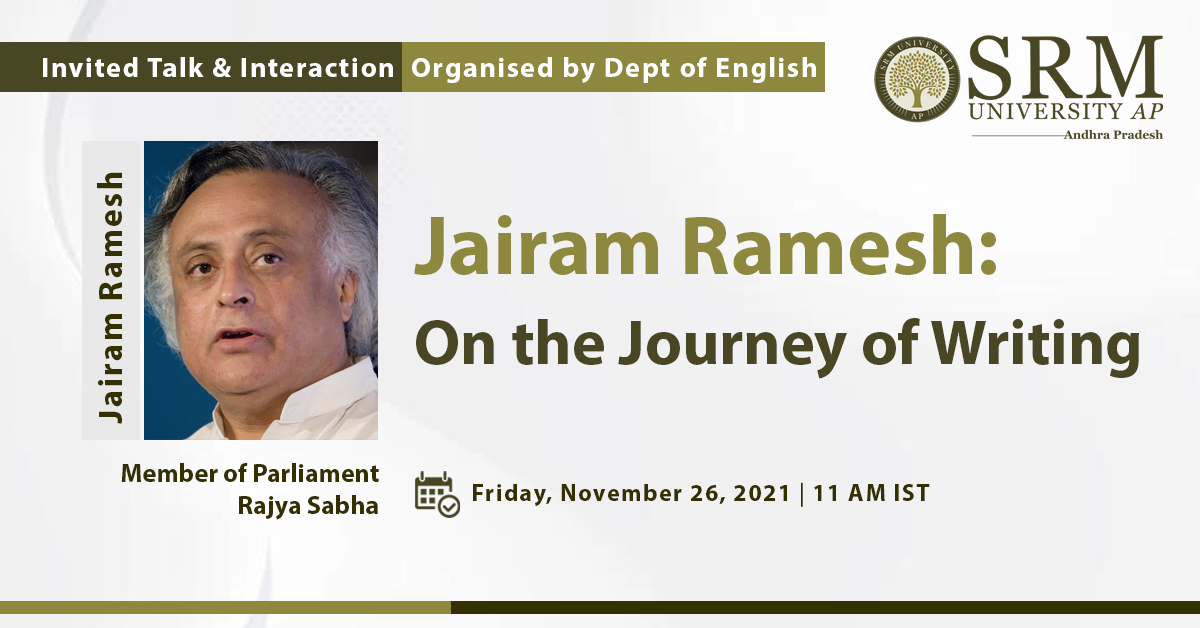 The Department of English at SRM University-AP invites you to an engaging webinar on November 26, 2021, at 11.00 am. Mr Jairam Ramesh, Member of Parliament representing the state of Andhra Pradesh, will be the guest speaker of the day.
The Department of English at SRM University-AP invites you to an engaging webinar on November 26, 2021, at 11.00 am. Mr Jairam Ramesh, Member of Parliament representing the state of Andhra Pradesh, will be the guest speaker of the day.
Writing is a process of pain and pleasure. Every writer approaches, experiences, and survives it in a unique way. In this talk and interaction, Mr Jairam Ramesh would share his idea and process of writing. His talk would be followed by an interaction about his latest book The Light of Asia: The Poem That Defined The Buddha (Penguin, 2021). The talk is intended to be a part of the Department’s larger initiative to organise interactions around “Language and Society” to address all kinds of conversations about language, communication, writing, speaking, thinking, and at a deeper level, about connecting with others.
About the Speaker:
Jairam Ramesh is presently a Member of Parliament and Chairman of Parliament’s Standing Committee on Science and Technology, Environment, Forests and Climate Change. He was Union Minister between 2006 and 2014 and held several portfolios including Commerce, Power, Environment and Forests, Drinking Water and Sanitation and Rural Development. He played a key role in global climate change negotiations in 2009 and 2010. He is also the author of several well-known books some of which are Green Signals: Ecology, Growth and Democracy in India, Old History, New Geography: Bifurcating Andhra Pradesh, To the Brink and Back: India’s 1991 Story, Indira Gandhi: A Life in Nature, Intertwined Lives: PN Haksar and Indira Gandhi, A Chequered Brilliance: The Many Lives of V.K. Krishna Menon and The Light of Asia: The Poem that defined the Buddha.
We encourage you to make use of this exclusive opportunity to interact with Mr Jairam Ramesh and understand the nuances of the writing process on November 26, 2021, at 11.00 am.
- Published in Departmental Events, English, English Current Happenings, Events, Webinars
Reading Skills: Insights from a Historian
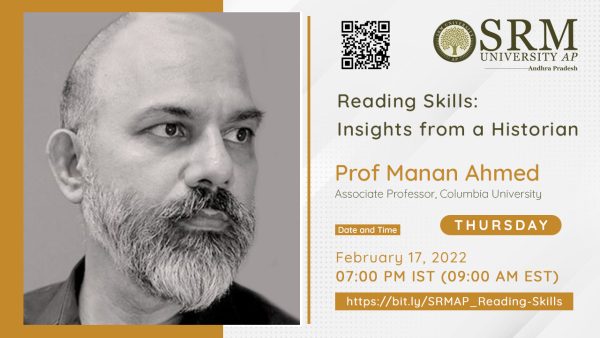 Reading means something different for everyone. Each person develops their reading skills as per their requirements. Some read to find information while others read to mine information. Some read to learn, and some read to laugh, some read to be entertained and some to escape. From reading the labels on new products to newspapers to novels, the objectives of reading can be plenty.
Reading means something different for everyone. Each person develops their reading skills as per their requirements. Some read to find information while others read to mine information. Some read to learn, and some read to laugh, some read to be entertained and some to escape. From reading the labels on new products to newspapers to novels, the objectives of reading can be plenty.
The Department of English is bringing Prof Manan Ahmed – Associate Professor, Columbia University to shed light on the reading approach and the reading skills of a historian in an interesting and interactive session.
Date: February 17, 2022
Time: 07.00 pm IST
About the Speaker:
Manan Ahmed, Associate Professor of History at Columbia University in the City of New York, is a historian of South Asia and the littoral western Indian Ocean world from 1000-1800 CE. His areas of specialisation include intellectual history in South and Southeast Asia, critical philosophy of history, colonial and anti-colonial thought. Two of his books The Loss of Hindustan: The Invention of India (2020) and A Book of Conquest: The Chachnama and Muslim Origins in South Asia (2016) are published by Harvard University Press.
Abstract:
“Reading Skills” brings to mind dreadful reading comprehension passages given in schools and courses in communication skills. However, reading is much more about finding answers to given questions. It is about finding the questions to ask of a passage, blog, article, literary texts, and historical texts. In this talk and interaction, Prof Manan Ahmed would walk us through a historian’s approach to reading. The programme is intended to be a part of the department’s larger initiative to organise interactions around “Language and Society” to address all kinds of conversations about language, communication, writing, speaking, thinking, and at a deeper level, about connecting with others.
Click here to join this exclusive session and develop an insight on reading through the experiences of our esteemed speaker.
- Published in Departmental Events, English, English Current Happenings, Events
Programmed sadness in the desire for connections and recognition
“Social media reality may be seen as a magical realm where we belong. That’s where the tribes gather, and that’s the place to be – on top of the world. Social relations in “real life” have lost their importance”– David Brooks
Technological sadness has become the default mental state of the online billions. The Department of English at SRM University-AP organises a guest lecture titled “Programmed Sadness” on April 11, 2022, to discuss the emotional analytics of network cultures. Prof Geert Lovink, Amsterdam University of Applied Sciences, will engage the participants at 3.30 pm on that day.
What happens when nothing can motivate you anymore, when all the self-optimisation techniques fail, and you begin to carefully avoid these forms of emotional analytics? Compared to others, your ranking is low – and this makes you sad. In this presentation, Dutch media theorist, internet critic and founder of the Institute of Network Cultures will discuss the dark side of the net. The mental state of internet users is tragic. Instead of empowerment and self-organisation, what we mostly see around is anger and despair. How did we end up like this? The lecture will zoom in on the widespread techno-sadness that is produced by dominant social media platforms through ‘behavioural modification’ (also known as ‘nudging’) with the aim to keep users coming back to the app, exposing them to even more personalised ads. Instead of empowerment and diversity, we witness a ‘chilling effect’ of hyper conformism, resulting in anger, sadness, depression and loneliness. This is the social reality today.
About the speaker
Geert Lovink is a Dutch media theorist, internet critic and author of Uncanny Networks (2002), Dark Fiber (2002), My First Recession (2003), Zero Comments (2007), Networks Without a Cause (2012), Social Media Abyss (2016), Organization after Social Media (with Ned Rossiter, 2018), Sad by Design (2019) and Stuck on the Platform (2022). He studied political science at the University of Amsterdam (UvA) and received his PhD from the University of Melbourne. In 2004, he founded the Institute of Network Cultures (www.networkcultures.org) at the Amsterdam University of Applied Sciences (HvA). His centre organises conferences, publications and research networks such as Video Vortex (online video), The Future of Art Criticism, and MoneyLab (internet-based revenue models in the arts). Recent projects deal with digital publishing experiments, critical meme research, participatory hybrid events and precarity in the arts. From 2007-to 2018, he was a Media Theory professor at the European Graduate School. In December 2021, he was appointed Professor of Art and Network Cultures at the UvA Art History Department.
All students and faculty members are invited to join this illuminating session on April 11, 2022, at 03.30 pm via the zoom platform.
- Published in Departmental Events, English, English Current Happenings, Events
Unwinding the transgender travails
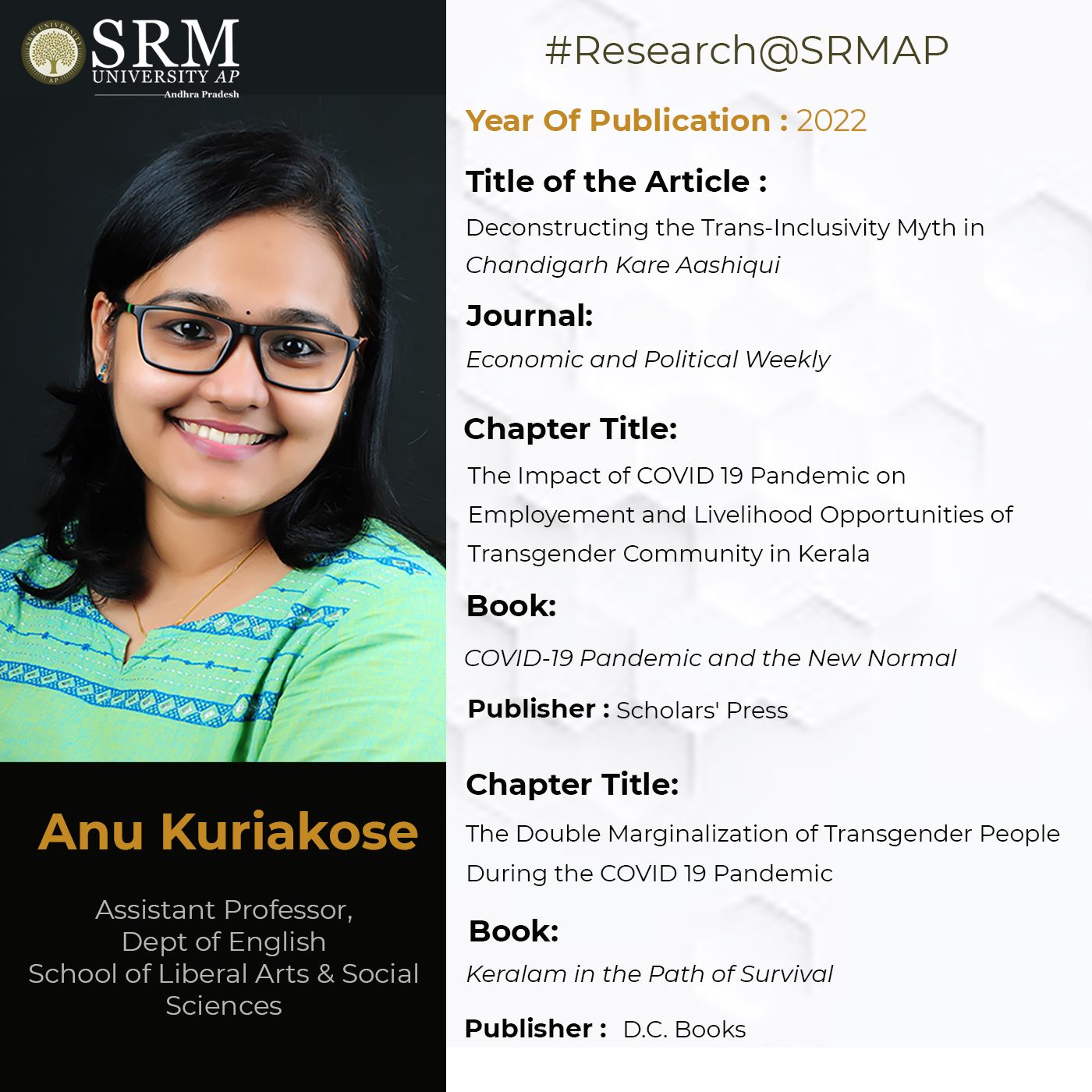
Embracing one’s transgender identity is a tremendous act of courage in a world that refuses to acknowledge their very existence. The narrations of their trials and tribulations continue to prevail despite the measures taken by the state machinery to assert their rights or the transgender revolution that spilt over in recent times. So long as the society continues to deny them a conducive space to exert their existence, the transgender community will have to endure hardships in all walks of life. The present-day researchers have increasingly shifted their focus on the LGBTQIA+ community to unravel their survival tales and awaken the population to their basic human rights.
Dr Anu Kuriakose, Assistant Professor from the Department of English, has also been looking into transgender lives and the anomalies in their representation. Her research analyses the inclusion and representation of transgender people in Indian films with a specific focus on the shift in representational politics and inclusive strategies in films of late. She has recently published a paper titled “Deconstructing the Trans-Inclusivity Myth in Chandigarh Kare Aashiqui” in the Economic and Political Weekly.
The article offers a critical reading of the Hindi film Chandigarh Kare Aashiqui (2021), which appears to maintain an inclusive outlook towards the queer community. Through the article, Dr Anu draws attention to the glaring presence of transphobic and homophobic attributes even in such progressive films. Her research attempts to analyse whether there have been any significant shifts in trans representation and inclusion in contemporary cinema.
She has also published two chapters, “The Impact of COVID 19 Pandemic on Employment and Livelihood Opportunities of Transgender Community in Kerala” and “The Double Marginalization of Transgender People During the COVID 19 Pandemic”, in the books COVID-19 Pandemic and the New Normal and Keralam in the Path of Survival respectively. The works recount the unspoken sufferings underwent by the transgender community in Kerala during the pandemic times. The chapters were co-authored by her peer, Dr Vinshi P K.
Her upcoming research plans include addressing gender diversity and inclusion in academic discourses in the vernacular of Kerala and critically reviewing the representational politics of trans femininity in visual cultural texts. By researching the portrayals of transgender community, Dr Anu intends to enhance awareness on the deviant representation of queer community in the realms of literature.
- Published in Departmental News, English Current Happenings, English news, News, Research News
Know your style of writing
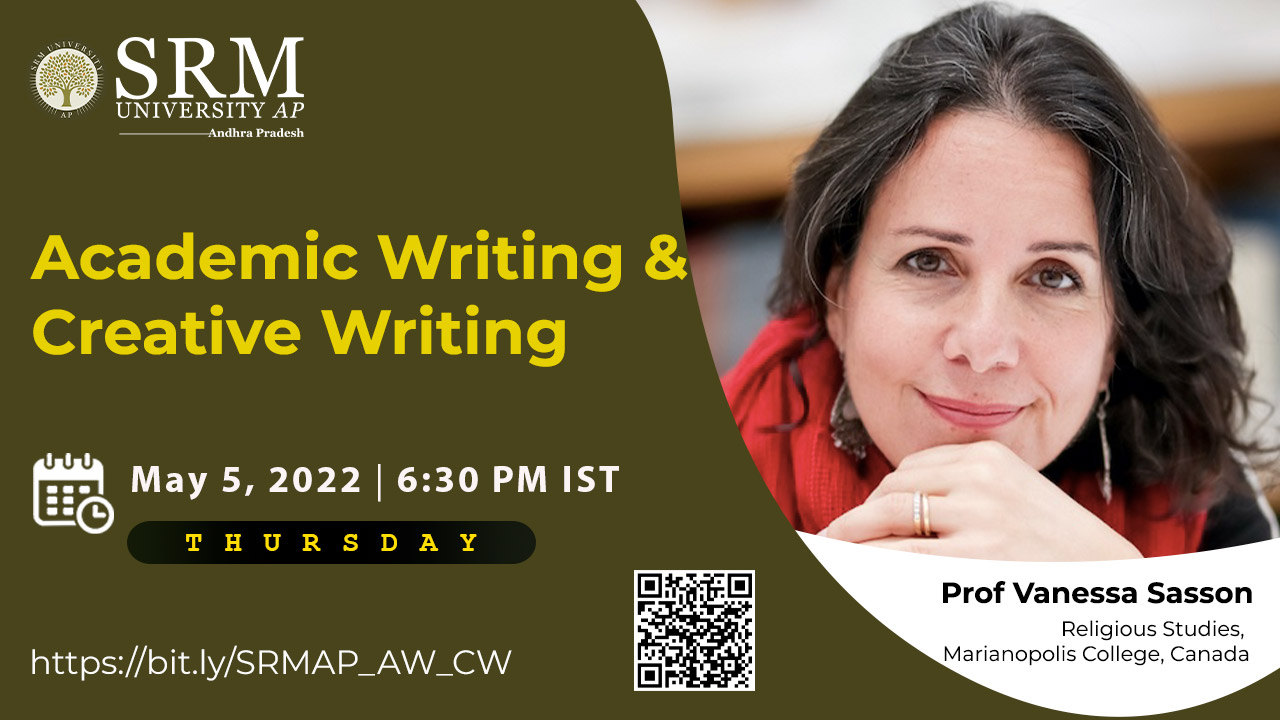
The art of writing can be branched out into different types depending upon the purpose of each piece of writing. You might have come across varied styles of writing such as creative writing, academic writing, technical writing and many more. Have you ever tried to deduce the difference between all these writing styles? Well, we offer you an informative session that will help you gather a better understanding of different styles of writing.
The Department of English has scheduled a webinar on the topic “Academic Writing & Creative Writing” under the theme “Language and Society” with Prof Vanessa Sasson as the keynote speaker.
Date: May 05, 2022
Time: 6.30 PM IST
Academic writing and creative writing seem to be pulling the act of writing and the writers in two different directions. A lot of writers, especially aspiring writers, tend to think of both genres as catering to very different audiences and fulfilling very different needs in very different contexts. Does that mean you can be only one and not the other? Do you have to choose? And how do you decide what to commit to? In this talk, Prof Vanessa Sasson will share her experience of writing in both capacities and discuss the joys and challenges of both.
About the Speaker
Vanessa R Sasson is a professor of Religious Studies in the Liberal Arts Department of Marianopolis College where she has been teaching since 1999. She is also a Research Fellow at the University of the Free State and a Research Member for CERIAS at UQAM. She has published widely as a scholar, with a number of academic books to her credit. Her most recent book was published by the University of Hawaii Press (2021) and is entitled, Jewels, Jewelry, and Other Shiny Things in the Buddhist Imaginary. Yasodhara and the Buddha (Bloomsbury, 2021) is her first novel. She is currently completing the sequel.
Join the Webinar to master the art of writing!
- Published in Departmental Events, English, English Current Happenings, Events
Dr Anu Kuriakose bestowed with CM’s Nava Kerala Research Fellowship
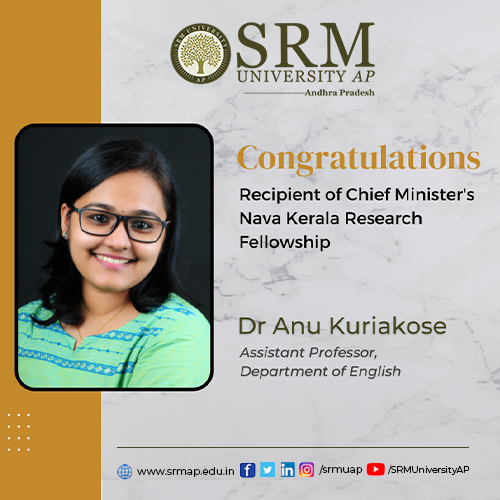
The Government of Kerala has chosen Dr Anu Kuriakose from the Department of English for the prestigious Chief Minister’s Nava Kerala Research Fellowship in the stream of Political Science, Historical Studies, Humanities & Liberal Arts. The award has been designed by Kerala Government to further the state’s development plans by promoting research across various disciplines. Dr Anu obtained the grant for her intriguing study in the domain of gender studies. She intends to look at the digital turn in the genderqueer movements in Kerala with a cross-cultural perspective from any specific locale in Europe.
There have been many research studies involving the examination of queer and trans representation in media. With the turn of the century, we witnessed a remarkable shift in the digital representation of the queer community.
Through her research “Dissenting Heteronormativity and Mainstreaming Identity: A Critical Assessment of the Digital Turn in GenderQueer Movements in Kerala”, Dr Anu is fixated on uncovering the digital collectives in which Malayali genderqueer people are also a part of and the digital turn in the genderqueer movement in Kerala, of late.
She expressed her delight over receiving this opportunity that could help her make substantial contributions to the state’s progress. “I feel proud and humbled for getting this title; my project aims to map the genderqueer movements, the digitally networked associations of which Malayali gender non-conforming people are part, and the nuances of their digital turn at present”, she said.
The Department of English, University of Calicut, has agreed to be a hosting centre for the research project. The GEXcel International Collegium for Advanced Transdisciplinary Gender Studies, Karlstad University Sweden, has also agreed to collaborate. She also wishes to make SRM University-AP a stakeholder in the same.
“I am hugely motivated by the weight SRM University-AP gives to research. From making collaborations to publishing papers in reputed journals and receiving grants from external bodies, the university has anchored as an encouraging platform to stimulate the research pursuits of its faculty and students”, she maintained. “I am truly indebted to my peers and everyone here for providing a conducive environment to fructify my research interests”, remarked Dr Anu.
- Published in Departmental News, English Current Happenings, English news, Faculty Achievements, News, Research News
Decoding the problematic narratives in mainstream Queer cinema
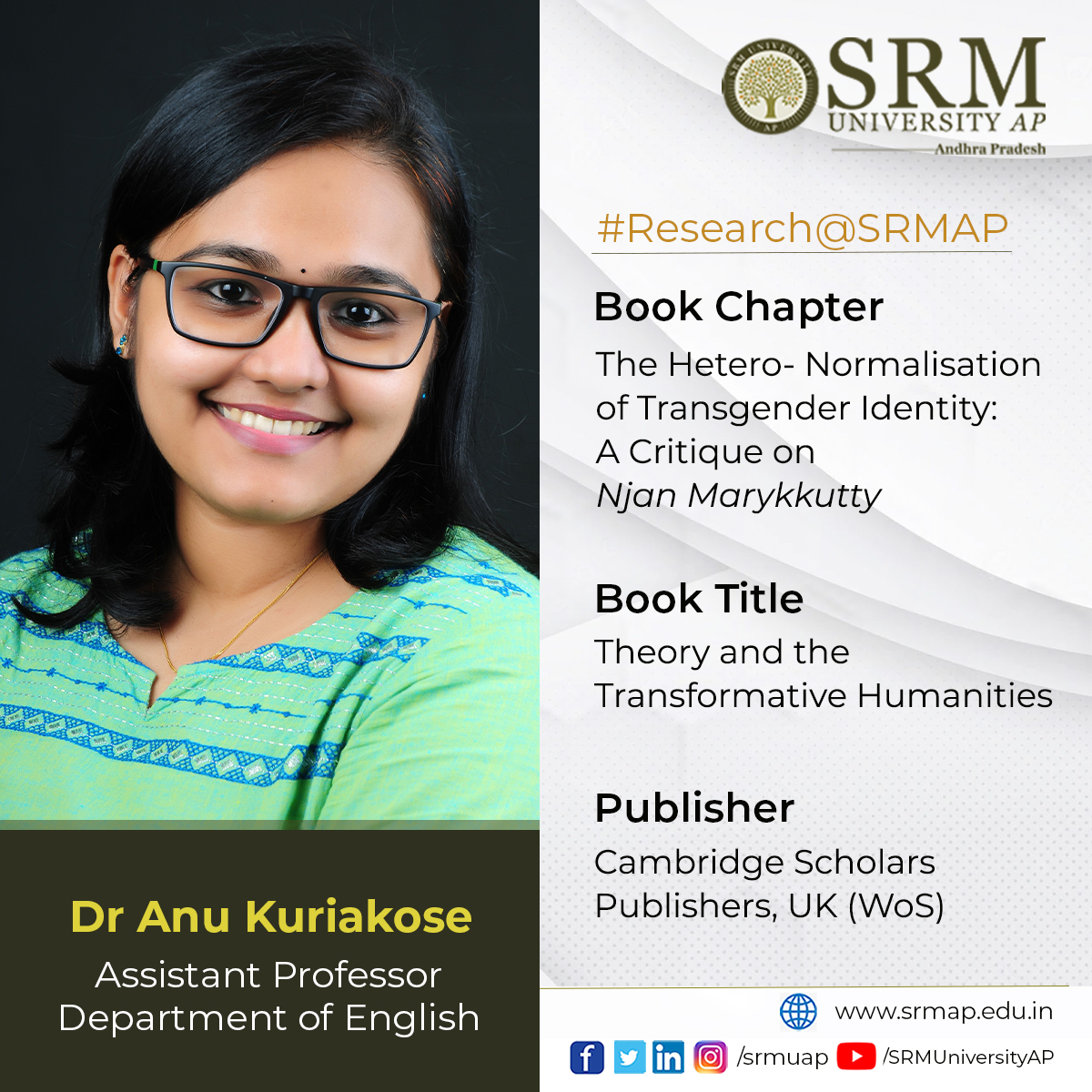 The trajectory of trans representation in cinema is essentially critical since the predominant viewers belong to the heteronormative cisgender public. Visual media played a massive role in inculcating the idea of gender identity into the preconditioned entity of heteronormativity. The skill and sympathy of the filmmaker in handling trans issues hold a significant chunk of this representational politics.
The trajectory of trans representation in cinema is essentially critical since the predominant viewers belong to the heteronormative cisgender public. Visual media played a massive role in inculcating the idea of gender identity into the preconditioned entity of heteronormativity. The skill and sympathy of the filmmaker in handling trans issues hold a significant chunk of this representational politics.
The popular media in Kerala has reconfigured its space to include people with gender non-conforming identities and sexual orientation as a matter of concern in contemporary times. However, there are times when the filmmakers fail to understand the assignment. The new research chapter of Assistant Professor Dr Anu Kuriakose, Department of English, articulates the discomfort of seeing the misrepresentation of transgender identity in mainstream cinema. The chapter titled The Hetero- Normalisation of Transgender Identity: A Critique on Njan Marykkutty was published by Cambridge Scholars Publishers, UK (WoS) and belongs to the book Theory and the Transformative Humanities.
Problems that face the humanities discipline today have sparked an intense debate across the globe. The Theory of the transformative humanities envisions a domain of inquiry that attempts to transform cultures, individuals, and society. This volume explores different theoretical perspectives and practical orientations through which to perceive, innovate and transform the world in which we live. It opens diverse fields of thinking and research. It offers a broader perspective on how a critical-literary approach could be deployed in addressing the multidimensional and evolutionary nature of the humanities in a way that caters to the needs of the present. A compilation of scholarly essays on topics as diverse as post-millennial theory, trans-humanities, posthumanism, interdisciplinarity, psychoanalysis, and film studies, the book provides an enabling platform for intellectuals, research scholars, and experts in the humanities to tap into the transformative potential of the field.
This chapter critically examines the representational politics of the central transgender character Marykkutty in the 2018 Malayalam film Njan Marykutty. The release of this film marked an unprecedented debate on transgender identity in Kerala’s public sphere, more specifically, about transwomen’s visibility in the public sphere. This is quite significant, as it has been a moment of the culmination of various activist, academic, and governmental interventions in the state attempt to mainstream the trans identity from the margins of society. She has used visual and thematic analysis as a method to critically look at the visualization of a trans feminine body in this film. The chapter analyses the trans identity in terms of Judith Butler’s theory of gender performativity, Julia Kristeva’s ‘abject,’ and Jacques Lacan’s notion of ‘object petit a’ or object of desire. It is argued that the excess in normalisation of the transgender body ironically endorses the heterosexual values of the binary gender performance when the surgically re-appropriated body is celebrated, clapped on the big screen, and sensationalised as an achievement when the central character themselves voices, “I am not a transgender, I am a transsexual.”
Heteronormativity safeguards the normalisation of heterosexuality through myriad practices so as to concrete the notion of a legitimate form of sexuality. Dr Anu Kuriakose attempts to denaturalise and denormalise the excessive lauding of heterosexuality in cinema to open up a less distorted corridor to queer desires and identity.
- Published in Departmental News, English Current Happenings, English news, News, Research News
- 1
- 2


